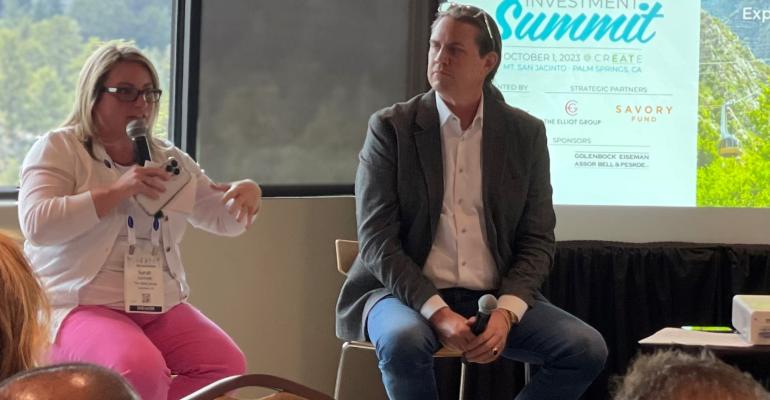Nation’s Restaurant News’ third annual CREATE: The Experience event kicked off Sunday with a bevy of events around host city Palm Springs, Calif., including a restaurant tour and a Jeep tour. One of the biggest first-day highlights was the inaugural Investment Summit, presented with strategic partners Savory Fund and The Elliot Group at the top of Mt. San Jacinto. The idea behind the event was simple: to connect emerging restaurant leaders who want to grow their brands with investors who might be able to help them do so.
Of course, now is as good a time as ever to integrate such groups in an intimate setting – with lingering inflation, supply chain/construction pressures and rising interest rates to contend with, expansion is tough. Andrew K. Smith, managing director of Savory Fund, and Sarah Lockyer, chief brand officer of The Elliot Group, talked about how to navigate such challenges and how emerging brands should get their house in order before seeking investment funds.
“We roll up to brands and look at the house to make sure it’s in order and fundamentally sound. That means everything from finances to HR to leadership to culture. Is it humming?” Smith said.
How do you get your house in order? Define clear roles, or what Savory Fund calls “your swim lane.” This should be a priority whether you have two units or 100 units.
“You need to have control and discipline,” Smith said.
Lockyer agreed, adding that one of the biggest mistakes she sees in her role is leaders thinking about too many things.
“Hire for the competencies you don’t have. That takes self-awareness, but it’s the biggest opportunity,” she said.
Companies who want to grow should start with their mission/vision/values. Lockyer and Smith agreed this is a critical fulcrum and that the right employees should be aligned with those statements. Smith added that it’s important for leaders to continue to “up level” to set an example for their employees to buy into the mission/vision/values.
“If you have five units and want to get to 50 or 100, talk to someone who has 50 or 100. Talk to others who are doing it ahead of you,” he said. “We’re not doing enough to up level, and we need to be. We need to teach our teams and make sure they become better.”
This is more critical than ever, and Lockyer pointed to Glassdoor data showing that employee satisfaction is the highest (91%) based on culture and values, followed by senior management and diversity and inclusion. Wages and benefits are No. 6.
“It was not this way five years ago. Wages and benefits are still high, but there’s a net 20-point difference between that and culture now. Culture and values are more important than ever,” she said.
That human capital piece starts with aligning business goals with employee needs.
“We need to be thinking more about employer brands as much as customer brands,” Lockyer said, pointing to Taco Bell as an example of a brand that exemplifies this approach. “And it’s important to remember that recruitment and retention requires investment.”
The leadership piece, Smith and Lockyer agreed, is the most critical piece of “having your house in order.” But the financials are table stakes. Smith said to ensure the economics are in place to entertain the idea of scalability, operators must have a clear vision of what they’re trying to accomplish.
“We focus on organizations that have a long-term vision to build something special for a long period of time. If it’s more about speed to grow fast, make as much money as you can and then get out? That’s going to be a short conversation for us,” he said. “You need to find your ‘why’ before you grow. And the store-level economics have to work. Profitability is important.”
That means it’s more important to focus on the restaurants you have now than it is to grow.
“Traffic is tough, but you’re not going to solve that by growing more restaurants,” Smith said. “If I wasn’t in this industry, I’d be a race car driver, and I’ve learned that you have to race with both feet. You have to use both feet to get the car stable to make the turn. That’s my analogy to you today: Slow down to speed up. It’s ok to slow down and think about your next moves.”
Contact Alicia Kelso at [email protected]





